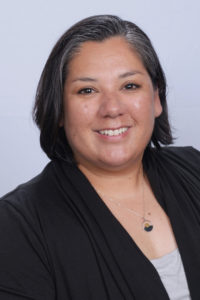 This post was written by Kelley Klor (@MsKelleyK), who attended the 2022 DLF Forum as a Student Fellow.
This post was written by Kelley Klor (@MsKelleyK), who attended the 2022 DLF Forum as a Student Fellow.
Kelley M. Klor is currently pursuing a Master’s degree in library and information science (MLIS) at the University of Missouri School of Information Science & Learning Technologies. She graduated from the Missouri University of Science and Technology with a Bachelor of Arts in Biological Science in 2007. As a currently active-duty military spouse, Kelley is a food insecurity consultant with a military service nonprofit organization.
Kelley has an interest in the intersection of quantitative research, creative solutions, education, and informing policy and believes that skills developed in reference and digital library technologies can be used to create a more economically stable environment where military-connected families can thrive.
Kelley and her family live in Northern Virginia, and when she isn’t advocating, she enjoys volunteering, hiking, reading, and learning new skills with her family.
The Heart of Archives: Providing Healing Medicine in the Form of Cultural Preservation
Before library school, archival work was not top of mind. I assumed that archives meant organizing collections of papers into boxes. It took involvement in my university’s student SAA chapter to realize there’s more to archives, and decided on the archives emphasis in my program. After attending the DLF Forum, I realized that archival work is spiritual, healing, and works to capture the experiences that make our human lives meaningful.
We live in a world of conflict. The destruction of cultural sites, monuments, and libraries is purposeful. Survivors will struggle with loss of identity. In short, when culture is destroyed, identity is destroyed. Once it’s gone, it’s impossible to get it back.
The trauma of severe violence and loss is in my genetic memory. I know the history of my ancestors and recognize the devastation of enduring the Trail of Tears, then establishing a new home. I imagine what it would be like to lose basic rituals – family dinners, movie nights with my kids, our daily walks, our nightly bedtime routine, our holiday and birthday celebrations, our trips to the library, discovering the sites around us as we move to new communities every few years. These rituals may not be super noteworthy to anyone else, but they give me identity as a person, a mother, a wife, a Cherokee woman, a military spouse, and as a library student.
Cultural rituals, practices, and basic routines are wiped away during conflict. Memory of recipes, dances, songs, religious practices are, unfortunately, fragile. The presentation, Community-led Digitization of Archives and Cultural Heritage: The Way Forward in Iraq by Khora Nanno, Helena Rose, and Peter Herdrich, captivated me because of their discussion of the preservation of oral history and intangible cultural heritage. The emphasis on building trust and making decisions jointly with the community highlights the humanity that goes into archival work.
Another presentation, Building/Digitizing/Preserving Community Archives, by Elliott Shore, Jennifer Garcon, and Fenella France, emphasized the importance of working with individuals in community archival work. Even a consideration like choosing an intentional location is a way to build trust and relationships.
The work of archivists to preserve intangible heritage has a part in revitalizing communities, and gives people an identity and a link to their past. When archivists improve methods allowing the capture and preservation of heritage, a spiritual and psychological medicine is created. Preserving memories can enhance the human experience for people we will likely never meet.
Doing this work is a privilege, and I feel more motivation to dive in deeper. I imagine all of the opportunities that exist to preserve the heritage of Native American communities in a way that is respectful and empowering to the people involved – with their partnership and consent. I imagine the revitalization of culture and healing that could take place with scalable and reproducible workflows.
I still have another year of library school and so much more to learn. For me, it helps to keep the human experience element in mind as my purpose for doing this work. I’m specifically interested in preserving Indigenous traditional knowledge because so much has been lost already. Thanks to CLIR for giving me the opportunity to attend the DLF Forum as a Forum Fellow, I had the great privilege of meeting so many professionals and fellow students who share this passion and motivation.
Thank you to Texas Digital Library, sponsor of the 2022 DLF Forum Student Fellowships.

